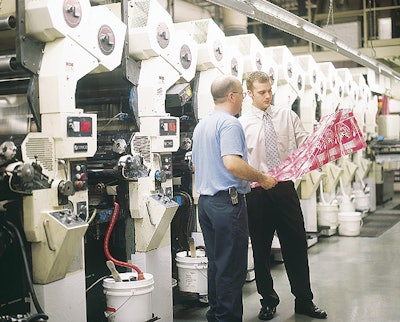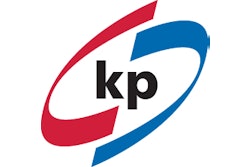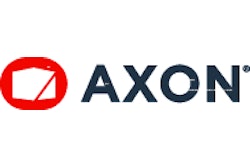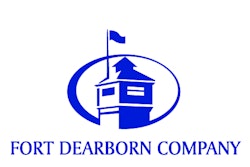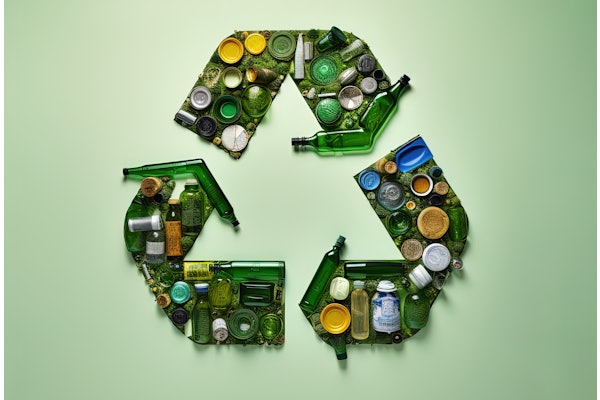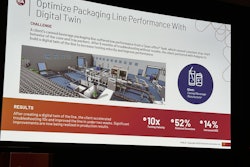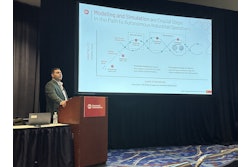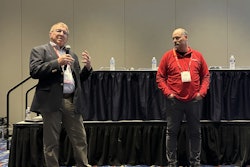When Oberweis Dairy’s licensing arrangement to offer a 12-oz single-serve bottle of milk decorated with Looney Tunes graphics expired last December, the firm seized the opportunity to introduce its own label of single-serve refrigerated milk. The North Aurora, IL, firm didn’t waste any time, either. Oberweis’s “happy cow” line began reaching refrigerated cases in midwestern markets on January 15 of this year.
Oberweis refers to the new line of 12-oz PET bottles as the “happy cow” line because each of the five flavors features a label showing a hip, happy cow wearing cool shades while skateboarding, surfing, roller blading, or acting in some other healthy, happy fashion.
The new packaging seems to have caught on quickly, says director of marketing Mark Vance. “In just five weeks we were nearly at the peak volume that we achieved with the Looney Tunes line after four months,” says Vance.
Vance gives much of the credit to Fort Dearborn Co., the converter of the full-body shrink-sleeve label that gives each bottle so much of its playful irresistibility. Not only does Fort Dearborn supply the happy cow labels, its Virtualcolor studio services group also came up with all the label designs. According to Vance, Oberweis gave Virtualcolor a design concept statement that “happy cows give good milk.” Virtualcolor did the rest.
“The creative process went smoothly,” says Vance. “They gave us a few concepts, did some refining, and then nailed it.”
According to Fort Dearborn’s Tim Nicholson, who was general manager at the plant where the labels are made when the project began, printing the happy cow labels is no walk in the park.
“One of the things we’ve had to develop stems from the fact that the Elk Grove Village plant in Illinois where these labels are produced is a water-based ink facility,” says Nicholson, who now is senior director of business development. “With shrink-sleeve labels you can run into trouble with standard water-based inks. That’s because the steam used in the shrink process on the bottling line can attack the inks and make them bleed. So we had to develop a more robust ink system than what’s usually used. We had considerable help from our ink supplier.” That supplier is Environmental Inks.
Anilox issues
Oberweis’s choice of process printing instead of simple line art also placed certain demands on the ink system, says Nicholson. “Line art is simpler. You carry a lot more ink in the anilox roll. But in process printing, you carry a lot less ink because you’re dealing with higher line screens. The ink tends to dry into the cells of the anilox roll, which can give you an unacceptably dark print job. We’ve come a long way, again with help from Environmental Inks, in developing suitable ink systems.”
Another crucial piece of the shrink-sleeve label puzzle, says Nicholson, is the polyvinyl chloride film used to make the label, which, in this case, is Pentaprint® M276/41 from Klöckner Pentaplast.
“Klöckner’s film is easy to print on,” says Nicholson. “It has excellent lay-flat characteristics and its thickness is consistent. It also shrinks uniformly around the contoured Oberweis container.”
Fort Dearborn uses a Mark Andy Comco ProGlide Series flexo press to produce the five-color process-printed rollstock. The film is then slit and sent through one of two seamers to form the material into a tube. The tubed material is rewound and sent to Oberweis for application on an Axon sleeve-label applicator.
Oberweis marketers were so pleased with how quickly and effectively their shrink-sleeve-labeled milk established itself in the marketplace, the firm opted for the same approach when it introduced its line of coffee-flavored milks this spring. The same Klöckner material and the same printing process are used for this line as well. —PR
